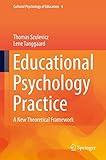Educational Psychology Practice [electronic resource] : A New Theoretical Framework / by Thomas Szulevicz, Lene Tanggaard.
Material type: TextSeries: Cultural Psychology of Education ; 4Publisher: Cham : Springer International Publishing : Imprint: Springer, 2017Description: XVII, 147 p. online resourceContent type: text Media type: computer Carrier type: online resourceISBN: 9783319442662Subject(s): Education | Teaching | Educational psychology | Education -- Psychology | Child psychology | School psychology | Education | Educational Psychology | Teaching and Teacher Education | Child and School PsychologyAdditional physical formats: Printed edition:: No titleDDC classification: 370.15 LOC classification: LB1050.9-1091Online resources: e-book Full-text access
TextSeries: Cultural Psychology of Education ; 4Publisher: Cham : Springer International Publishing : Imprint: Springer, 2017Description: XVII, 147 p. online resourceContent type: text Media type: computer Carrier type: online resourceISBN: 9783319442662Subject(s): Education | Teaching | Educational psychology | Education -- Psychology | Child psychology | School psychology | Education | Educational Psychology | Teaching and Teacher Education | Child and School PsychologyAdditional physical formats: Printed edition:: No titleDDC classification: 370.15 LOC classification: LB1050.9-1091Online resources: e-book Full-text access | Item type | Current library | Collection | Call number | Copy number | Status | Notes | Date due | Barcode |
|---|---|---|---|---|---|---|---|---|
| E-Books | MEF eKitap Kütüphanesi | Springer Nature | LB1050.9 -1091 (Browse shelf (Opens below)) | Available | NATURE | 1419982-1001 |
Introduction -- Introduction to Part 1: Educational psychology practice as it stands today -- Chapter 1: What is educational psychology practice? -- Chapter 2: Approaches and methods used in educational psychology practice -- Chapter 3: Inclusion as a (new) priority for educational psychology? -- Chapter 4 Educational psychology - background factors -- Introduction to Part 2: Educational psychology practice 2.0 -- Chapter 5: A pragmatic consultation approach -- Chapter 6: Educational psychology practice - a divided field -- Chapter 7: The educational psychologist as everyday researcher -- Chapter 8: Innovative and creative forms of PPC practice -- Chapter 9: Concluding thoughts on the past, present and future of educational psychology. .
This book sets out a proposal for applying psychological and educational psychology concepts to improve work with children and young people. It also suggests how some of the criticism aimed at pedagogical-psychology practice can be answered. In several respects educational psychology practice seems to be in a transition phase and could even be said to be suffering an identity crisis: educational establishments and education policy alike are looking for different skills than those the psychology profession traditionally provides, and people are generally questioning the relevance and applicability of pedagogical-psychological counseling. The book is based on the fundamental premise that good professional practice is contingent upon circumstances that allow practitioners to apply their knowledge, experience and skills in the specific encounter with a specific task. This means that the ability to act pragmatically and creatively is, and will increasingly be, an important skill not only for educational psychologists, but also for psychologists in general. In other words, psychologists must be able to contribute to tasks in new ways and new contexts when required. Intended primarily for students of psychology, school psychologists and other professional groups that provide counseling in schools, the book is also a valuable resource for the various groups that use pedagogical-psychology tools and insights in their work with children and young people.
5
